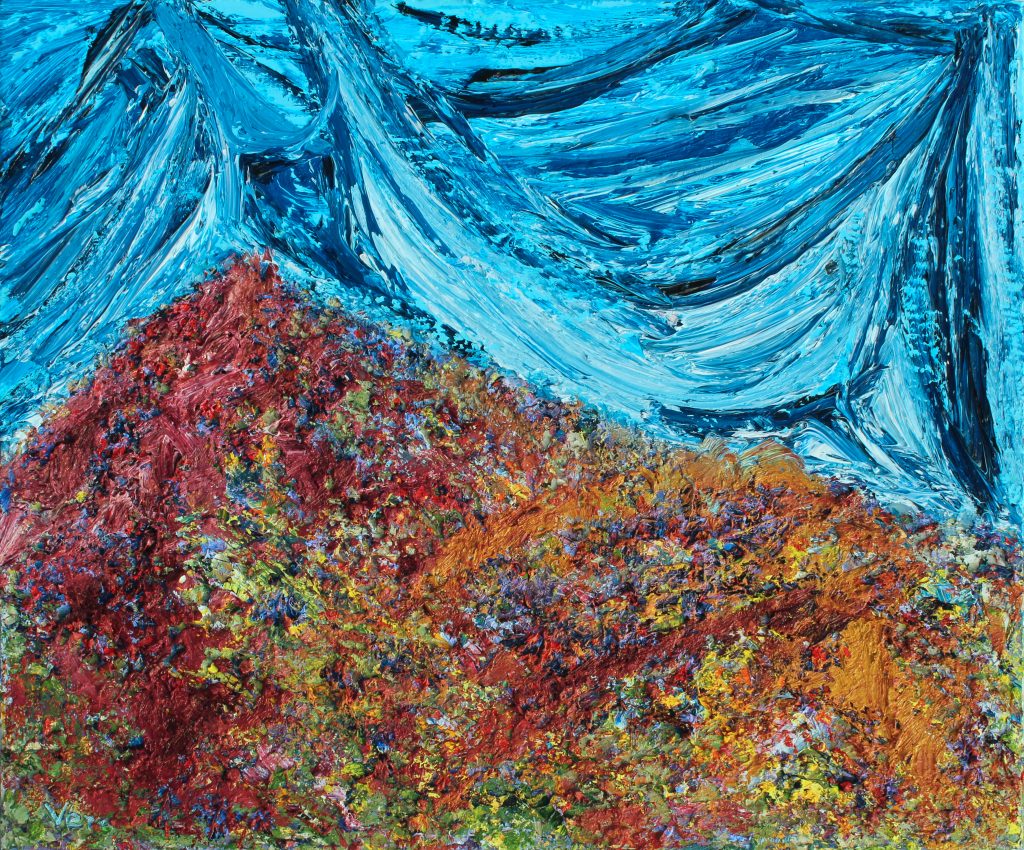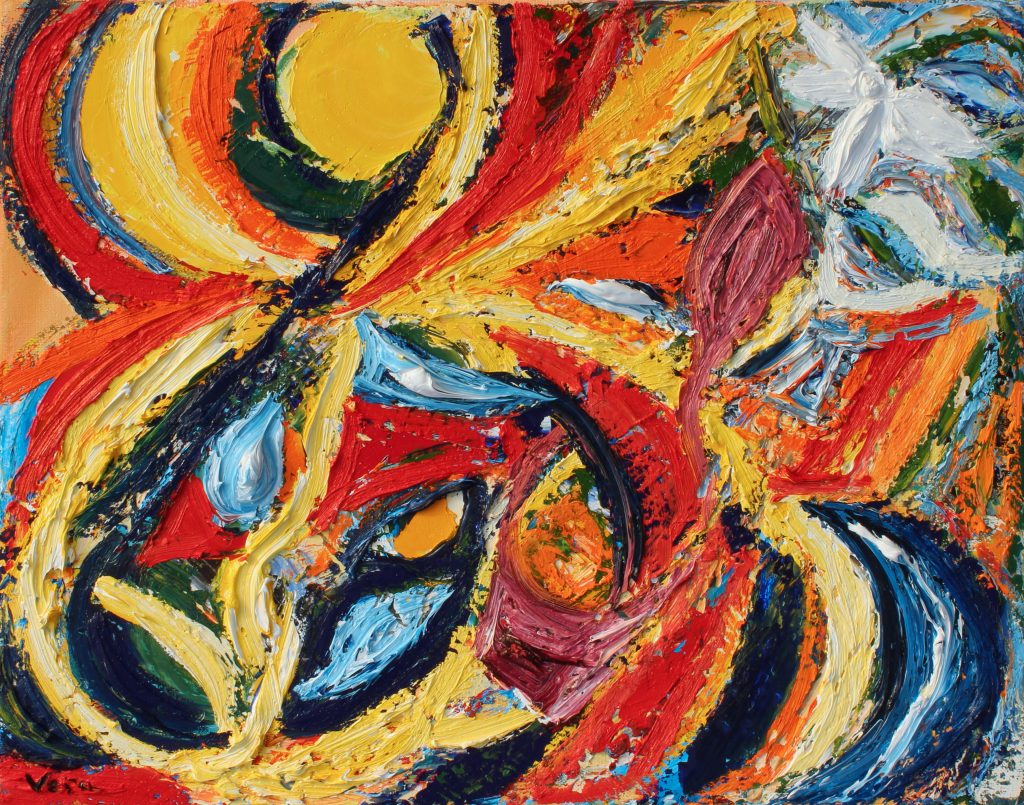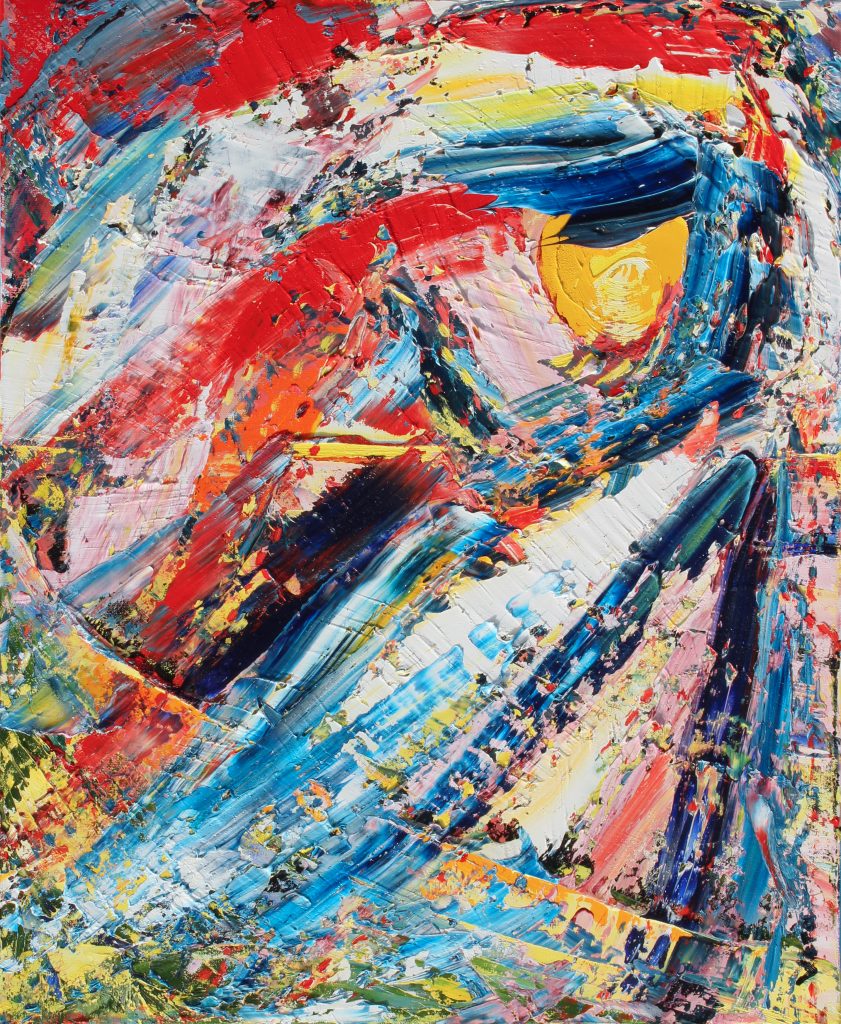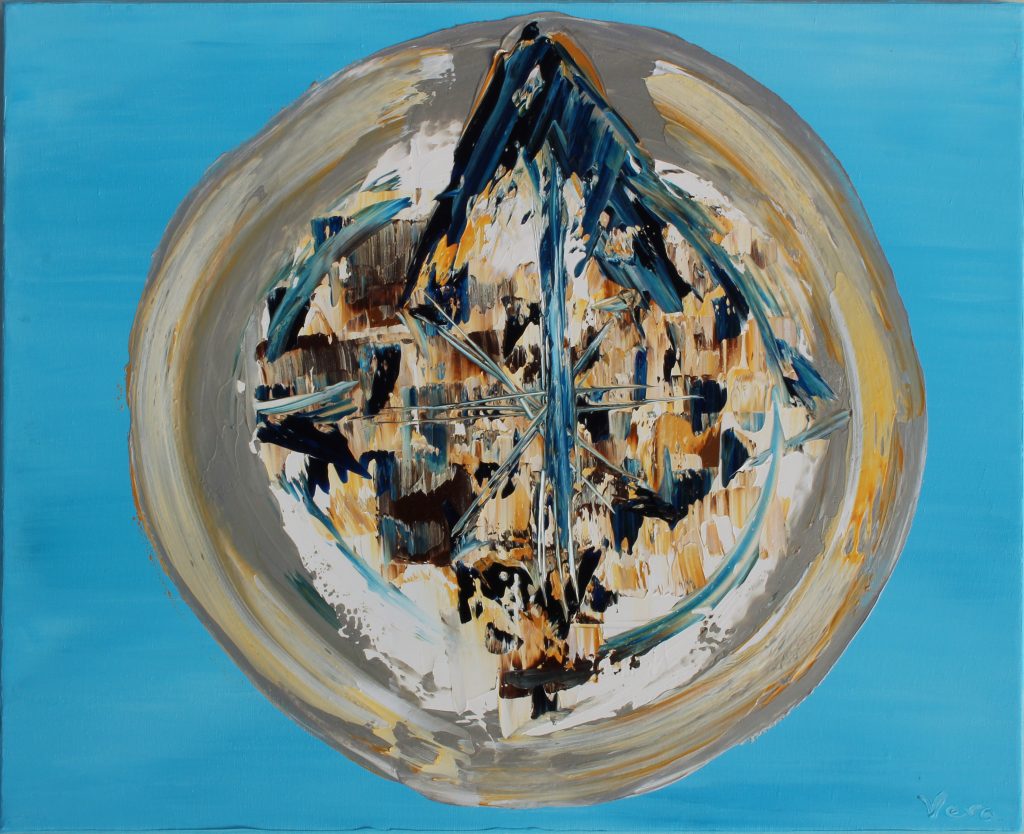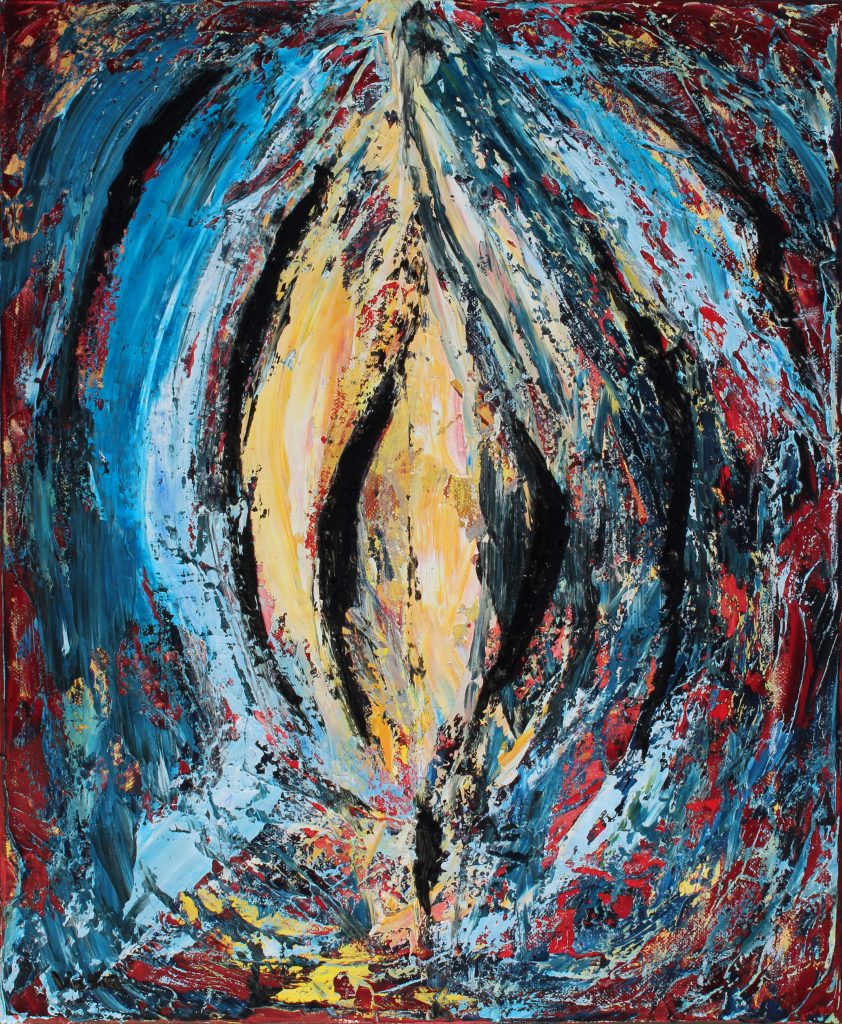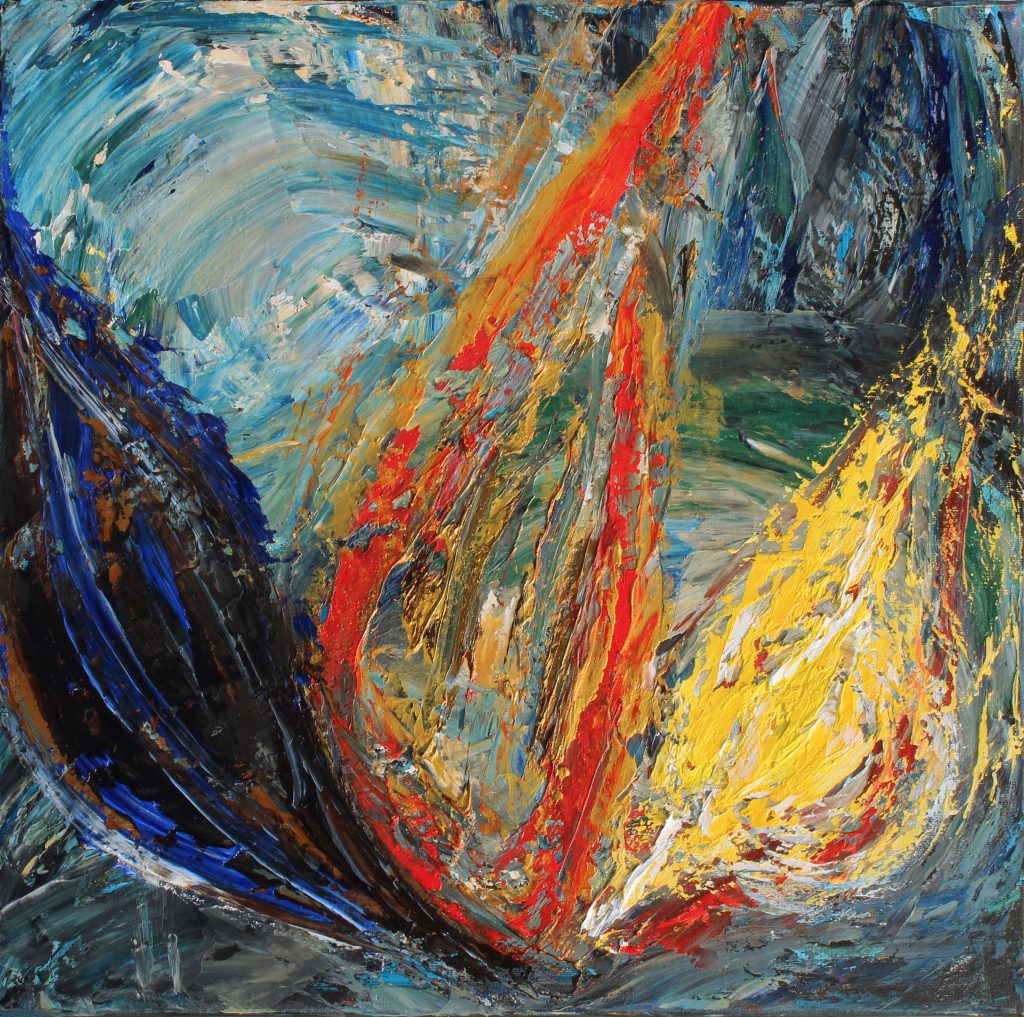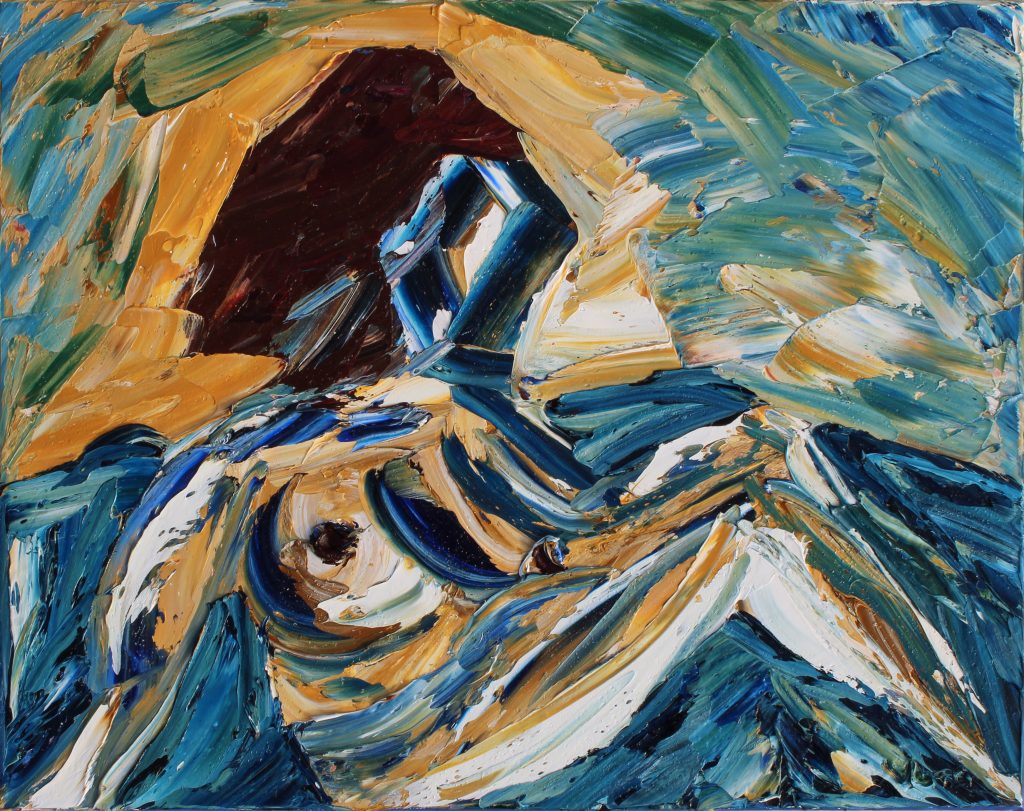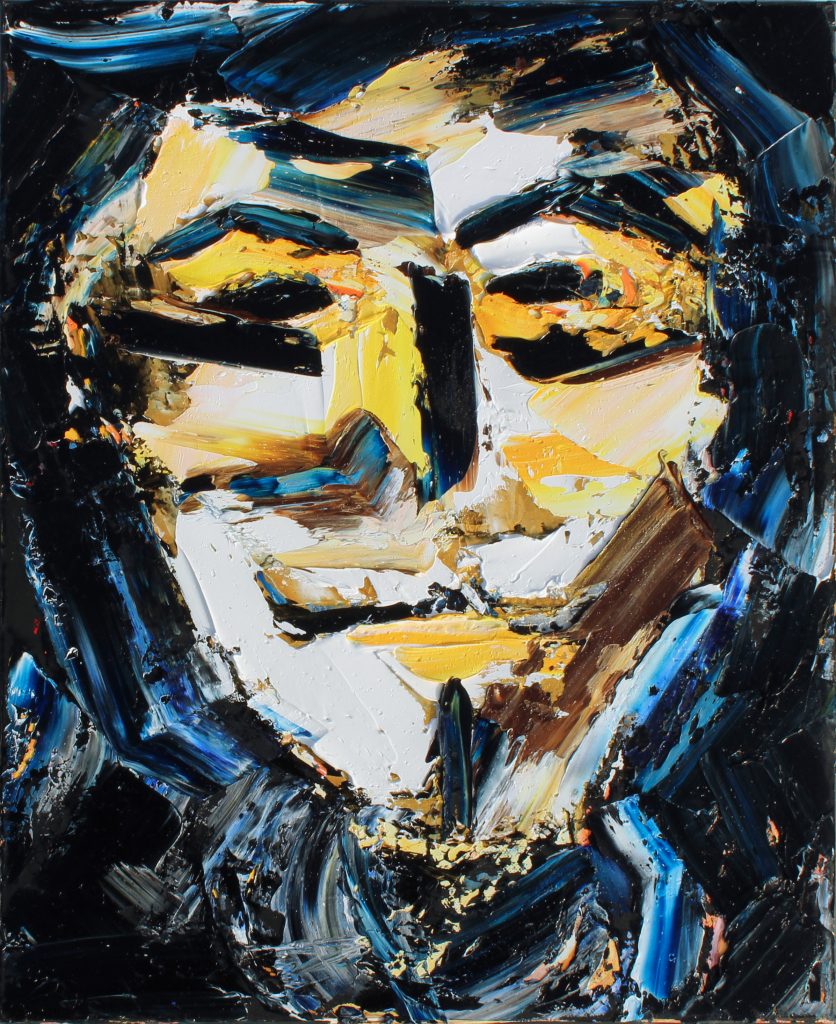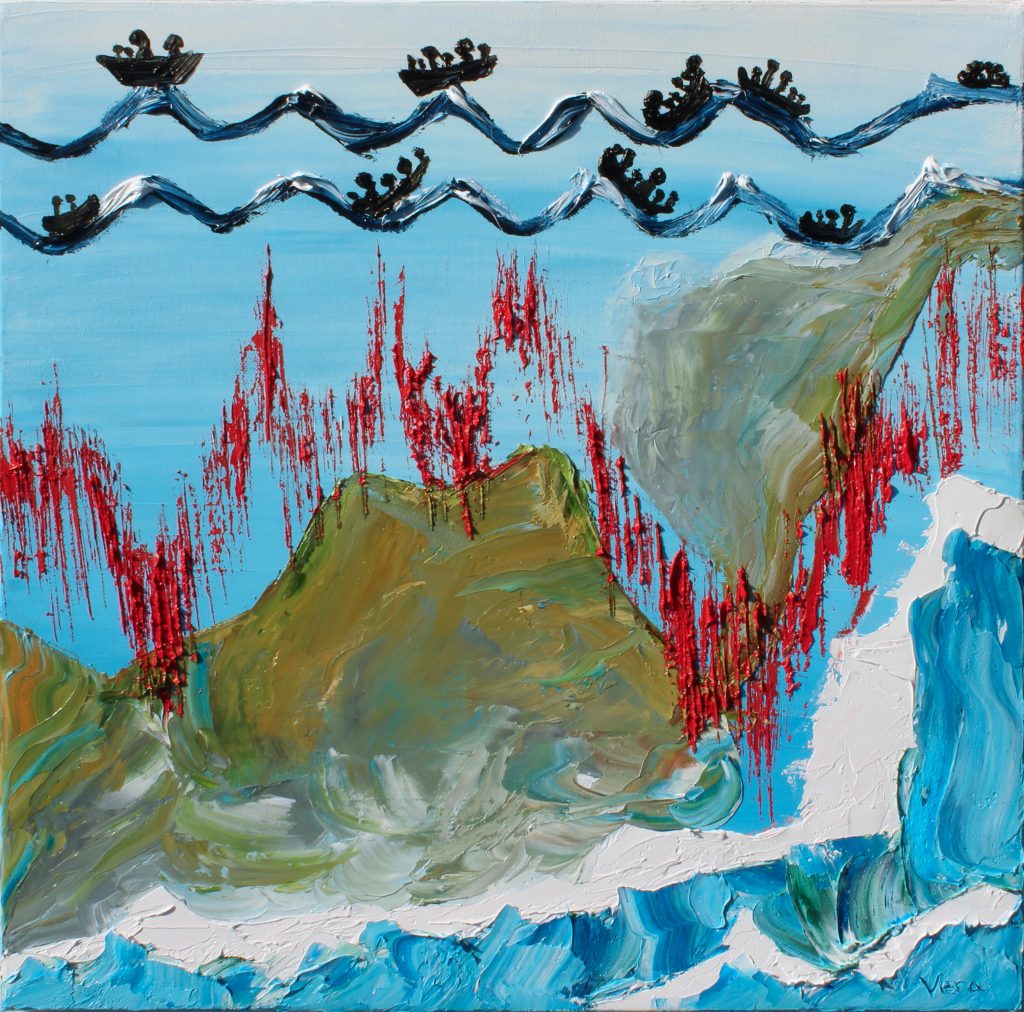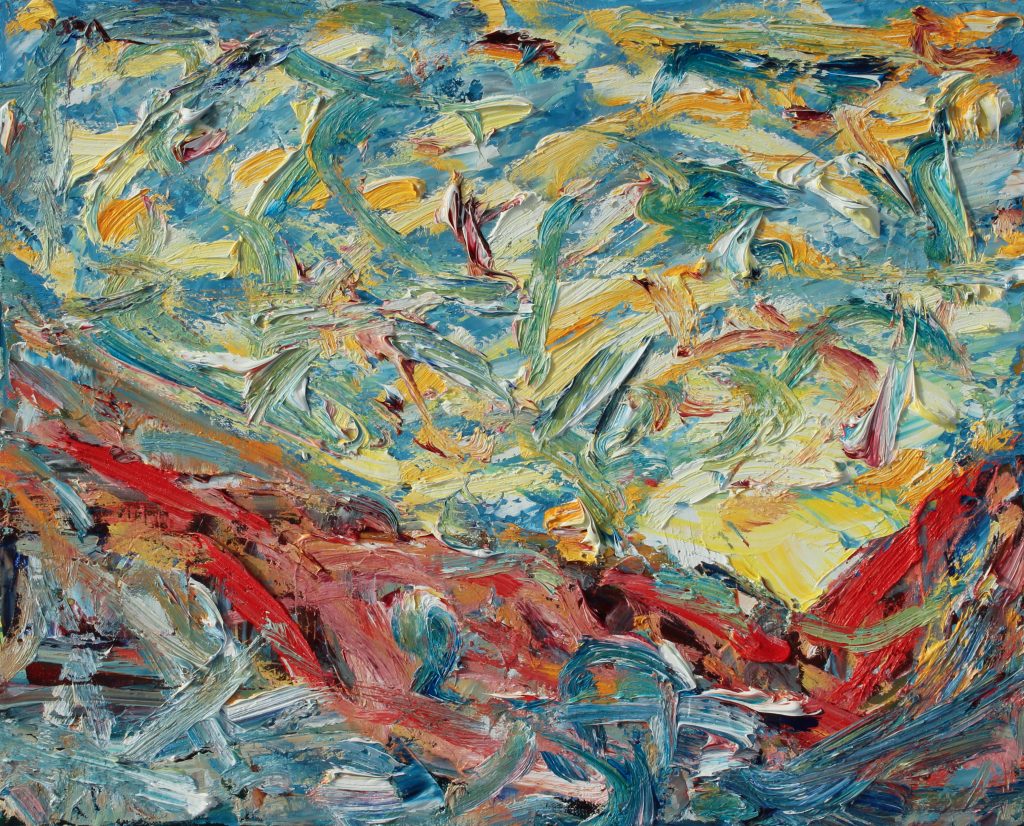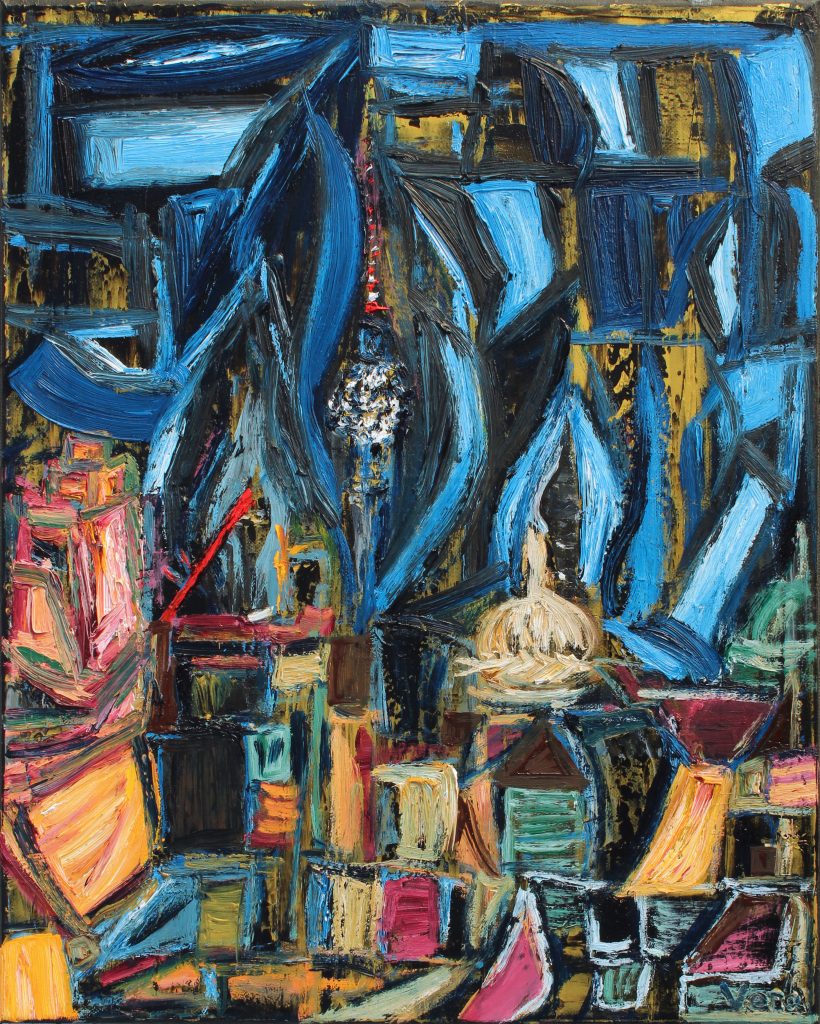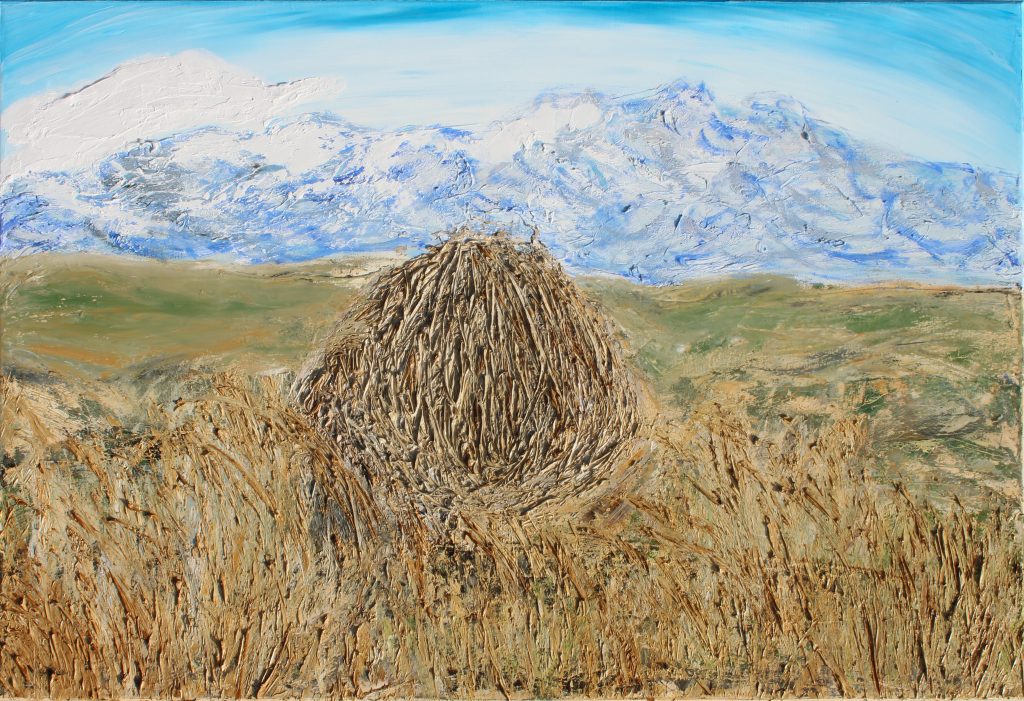Month: November 2016
Pleasant Daydreams
Monorail
Oils on 40 x 50 cm stretched canvas (web store). Inspired by my trip to Japan last year to present my research at an American Studies Symposium at Osaka University.
True North
Reporting Live
“Sophisticated Lady,” oils on 40 x 50 cm stretched canvas (web shop). A poem and painting inspired by Blossom Dearie’s take on the jazz classic.
“Reporting Live”
Always the secretary, never the demolitionist,
I catch the crumbling world’s bouquet.
Perhaps bearing witness is all the mission is.
Not a fearless leader to check in with today.
Three Sisters
Oils on 40 x 40 cm stretched canvas (web shop).
“Three Sisters”
After Adrienne Rich’s “Women” and Chekhov’s Three Sisters.
We are three like and fitted flames flickering on the fit-tossed sea.
People watch us from ashore, tossing up and down, glowing less and more.
They stretch out in our desires for a foreign shore.
One of us wears black, seeks light and love, confesses all, cries easily,
longs but does not: act, hope, pray to some great director above.
She is drinking away Moscow, has not enough gall to go, makes her heart measly.
Another wears red, but feels her young blood already faded, marriage jaded.
She is giving away the wardrobe and the rooms, keeping papers graded.
She is too practical for Moscow, feels her time already traded.
The third sister is a yellow flame, pale and bright.
Her happy animal body knows how to dance in the light.
She plans to refuse its demands, force herself farther from delight.
As if to get to Moscow, we must only work, denying sleep and play.
As if the waves get there by crashing, smashing the light of day.
But flames on the sea keep glowing by reflecting light in spray.
Some days we are already there, although the sea never carried us home.
We had to do it ourselves, vagabonding, though we never meant to roam.
It happened that the currents helped us along, as time passed
and our own shores were wrong.
Our own shores were no longer ours.
So reaching Moscow became within our powers.
безумно красивая
Support Lauri Love
This week U.K. Home Secretary Amber Rudd approved Lauri Love’s extradition to the U.S. to face charges for his alleged hacktivism in digital recognition of Aaron Swartz. This decision is alarming as it places a vulnerable person in mortal danger, violating the Human Rights Act. It’s also alarming because Lauri is a tech thought leader who stands for freedom of expression, association, and conscience.
“Anonymous Love,” oils on 40 x 50 cm stretched canvas (web store).
Please write your U.K. MP and donate to Lauri’s Courage Foundation legal defense fund. Following on my previous successful painting auction for his defense fund, I’m offering a special discount on everything in my online shop for the next 14 days—when you donate 250 euros or more to Lauri’s defense. Email for details.
The Naked Polygraph Project
Oils on 50 x 50 cm stretched canvas (web store).
Memo to the Department of Fantasy Fulfillment:
Today on The Science Creative Quarterly I explain how mass surveillance programs hurt security—and how next-generation polygraph (“lie detector”) programs that are one example of such programs have been recently field-tested in the U.S. and Europe for mass screenings at border checkpoints. To prevent the widespread adoption of these programs harming security, protect innocent people including millions of future climate refugees from being subjected to such technologies, and have more fun at festivals by bringing something more of my own to the party, I propose to develop the Naked Polygraph. The Naked Polygraph Project involves figuring out how these things work, breaking them, and showing others how to break them. This fantasy project has the following fantasy needs…
Equipment
Polygraphs
Lafayette (LX) 5000 Polygraph System (federal standard), including seat and foot pads
Other polygraphs of similar class, analogue and digital
– For example, LX 4000. Its established vulnerability to a glitch underscores the need to use both analogue and digital equipment in executing a hypothetical class break.
– Lafayette’s primary competitor is Stoelting.
Next-Generation Polygraphs
The Department of Homeland Security’s FAST (Future Attribute Screening Technology) toys
The National Center for Border Security and Immigration’s AVATAR (Automated Virtual Agent for Truth Assessments in Real-Time)
Documentation
Manuals for such equipment
Documents relating to use of such equipment
– My encrypted contact info is on my about page.
– My experience working with this sort of material includes National Science Foundation-supported Doctoral Dissertation research, collaboration on a national investigative series, NSF postdoctoral research, and making Freedom of Information Act (FOIA) history.
Misc.
Extra ropes for tying people up when the polygraph does not satisfy.
Aim
Shut down all the polygraph programs in the world
Interrogation best practices reform and accountability for torture as long-standing police practice
End mass surveillance
Not get killed
Reconcile self to the dominance of corrupt rent-seeking élites
Make fun of “lie detection” in an evidence-based, fun way that eventually empowers people to learn how these things really work
Create the evidence that might prevent widespread adoption of next-generation polygraph technologies that would harm security and innocent people alike
Create the evidence for others to establish legal precedent making that prevention last a few generations because we have other stuff to do
Disclaimer
This is not a counter-intelligence project. I am not a spy or a terrorist, although I’ve been told some people at the Department of Defense think otherwise. The Naked Polygraph Project is an independent, non-partisan, translational art + science + human rights project that seeks to prove and raise awareness of flaws in technologies that may be abused to deprive people of human rights including privacy, movement, and asylum. Unlike previous polygraph critics who have recently gone to jail for allegedly teaching counter-measures to people who planned to lie to federal agents, we intervene before hackers, scientists, and other at-risk groups agree to talk to feds at all.
Refugee Screening: A Brief Introduction (and Request for Equipment)
Published today on The Science Creative Quarterly.
Oils on 50 x 60 cm stretched canvas (web store).
Since I feel like this short online essay actually culminates years of research (quite by accident), I feel compelled to reiterate the usual social truth of such things: all the mistakes are mine and all the right stuff took a lot of help from my friends. I have so many people to thank for supporting me in continuing my work—even as what that means continues to evolve. It is with warm gratitude that I recognize and celebrate my friends at Hack42 in Holland where my artist residency has given me so much inspiration, Osaka University in Japan where presenting this research-in-progress at their American Studies Seminar last spring as an Emerging Scholar helped me have faith in its importance and see where it could improve, and the hacker, artist, and other scenes in Berlin that feed my heart and mind so well. I also remain grateful for the following research funding sources that supported parts of this and other related research—a National Science Foundation Postdoctoral Fellowship, NSF Doctoral Dissertation Research Improvement Grant, University of Virginia Raven Society Fellowship, UVA Society of Fellows Fellowship, Louise and Alfred Fernbach Award for Research in International Relations, and William McMeekin, Michael & Andrea Leven, and Bernard Marcus Institute for Humane Studies Fellowships—and to particularly thoughtful and engaging partners in dialogue Rop Gonggrijp, Arjen Kamphuis, Jos Weyers, and Ken Alder in this post-doctoral phase; George Klosko, Sidney Milkis, and Nick Winter in dissertation-land; Robert Fatton, Michele Claibourn, and Stephen Fienberg in my early graduate research and beyond; and Clay Ford, my stats buddy and fellow-traveller into the brave new world of Bayes throughout.
Sleepy Sun
Dream Sun
Revenge of the Church
Oils on 40 x 50 cm stretched canvas (web store). Celebrates the Pope’s Revenge (a visual effect where the sun hits Berlin’s communist-built TV tower, or Fernsehturm, forming a cross of light), the role of the church in East German resistance, and the way in which religious institutions, cultures, and rituals can give us sanctioned frames for unsanctioned, biologically underpinned experiences that can in turn lead to changes in social norms on a vast scale (Sapolsky).
The Day I Became a Romanian Hacker

This is an essay on how I’m not voting this Tuesday in what some call an historic U.S. Presidential election, even though I hold American citizenship—and a Ph.D. in American Politics. I wrote it on Nov. 2 (All Souls’ Day), and decided it was unpublishable in the current climate. Then I re-read Noelle-Neumann on the “spiral of silence” and re-listened to “Sound of Silence” (a few dozen times). Noelle-Neumann theorized that fear of isolation and other isolating reprisals (such as loss of job, professional network, friends, housing, education…) would tend to keep most people silent once the terms of the discourse are set, especially if the discussion has an emotional, moral tone—and most people disagree with what is being said. This creates a spiral of silence wherein the powerful can set the terms of the discourse by speaking first, because reasonable people might then be afraid to say what they think.
Basically, Simon & Garfunkel—as usual—were right: “ ‘Fools’ said I, ‘You do not know./ Silence like a cancer grows.’ ”
It first occurred to me that I was a Romanian hacker—like Guccifer, the guy who helped expose Hillary Clinton’s use of a private email server for classified information—on the last day of Día de Muertos, All Soul’s Day, seven days before the U.S. Presidential election of—well, to be honest, we don’t know yet, it’s just occurred to me today. I’m fantasizing about what it will feel like when it comes, if it comes to pass. But today is not meant for fantasizing about the future. Today is for commemorating the dead, especially in one’s family.
Most of them are strangers to me, as is always the case, but moreso. My grandparents lived in Florida when I was growing up in Alabama—or so I think, having lost contact early on—and had all died by the time I was twelve or thirteen. What they failed to leave me in inheritance, family history, and apparent genetic longevity, they made up for in having been demonstrably European. My mother’s family is no help, being in turns British, Welsh, Dutch, and Scottish—mostly outside the current Schengen Area of freedom to move, live, and work in most of Western Europe. Besides, they were Protestants who were not chased off the Continent by Stalin, Hitler, or their shadows. But my father’s family took enough shit to be of possible use.
After fleeing persecution for being Jewish in Poltava (now in Ukraine) and Romania—making me possibly eligible for European citizenship today—at least some of them must have settled in New York City. Growing up in the Bronx, my granddad must have seen enough poverty and suffering to become a card-carrying Communist in the McCarthy Era. That’s what the New York University archive of his papers suggests, documenting his journey to Spain to fight Franco and fascism in the Abraham Lincoln Brigade, the first racially integrated military unit in American history. It was before the U.S. decided World War II was on, so risking your life to fight fascism was illegal. The adventure cost Abraham Lincoln Brigade veterans dearly. They were blacklisted.
So was I. Twice. The first time, when I was 20, was after the CIA had offered me a job as a counter-terrorism analyst. They subjected me to three lie detector tests that violated equal opportunity law—interrogating me about stuff like my loyalty to the President, sexuality, and sexual history—and then lied to Congress about not letting me file an equal opportunity complaint. I proved it in documents I later contributed to a national investigative series. But McClatchy later took down their polygraph cloud documents from the series, and my former Freedom of Information Act (FOIA) lawyer took down the documents we had obtained during my years of graduate research on technology and bias. Both sets of documents came down around the same time as my second blacklisting. I also fired my FOIA lawyer, in a conversation during which he called me sweetheart (I told him to stop), refused to use encryption when I asked, and laughed when we talked about how I might get killed, around that time—but he pretended not to notice.
I had changed my name and moved cross-country twice without telling anyone in my family. No one noticed except my mother, who I had fallen out with when she changed the locks on the house we shared when I attempted to move out after taking care of her for ten years. I haven’t seen my father in over 20 years. It’s not complicated. My family needs to be trapped in a spa together on really good drugs and talk out some shit. But they never will. And the fact that I’m willing to talk doesn’t mean I’m any good at it. So it took nearly a year and a half after getting on a plane with a backpack with no plans to return to the U.S., for it to occur to me that I might not have to worry about my visa to remain in Europe until I’ve lived in Berlin long enough to apply for permanent residency or citizenship. I might be eligible for citizenship where these nice dead people I never knew and know nothing about came from.
It’s a bittersweet realization in the context of the ongoing refugee crisis. It seems a cruel irony that I might be able to attain with a piece of paper from people I never knew, the European citizenship that thousands of people die every year trying to get in line for. But such reflection is itself a luxury. I would like to legally have a right to live and work where I live and work, beyond the temporary relief of living visa to visa. Without that right or that visa, I would find myself adrift again in the world—perhaps on a plane to Southeast Asia to teach English and volunteer-stay in hostels, or otherwise bouncing between being here—building my new life in Europe—and being where I’m formally allowed to be that is not the U.S.
Romania seems like a better bet than Ukraine. Despite what the Defense dodos in their infinite paranoia may have decided, I don’t work for the Russians. War is not exactly my cup of tea. I can’t watch gory movies or throw a punch in the neighborhood kickboxing studio. (I tried, froze up, left, and cried.) But Romania, other than being a place I have never visited and know next to nothing about, sounds lovely.
My prospective new country was one of the most infamous European bitches of the CIA’s torture and rendition program, along with Poland. And border guards in the capital of Bucharest have continued their collaboration with U.S. security forces in recent field experiments testing next-generation polygraphs as mass airport screenings. I’d like to stop those screenings from becoming widespread, because they stand to contribute to the deaths of millions of innocent people. I’d like to see high-level U.S. officials held accountable in a court of law for war crimes including torture. And I’d still like to be a ballerina-fairy-princess-bride, my amalgamation of Halloween costumes the last year my parents were married and we lived in a big, light and air-filled house on a sunny, one-acre plot full of dogwoods and bunnies.
My angel costume from this weekend is packed away neatly in the wardrobe of the master bedroom in the big, light and air-filled apartment I share with my partner. It had been over twenty years since I had dressed up for Halloween. I dress up more and pretend less now than in past lives, like when I was a postdoc at Harvard with health insurance that only worked in California and a name change certificate from the county courthouse in Virginia. My new name is right. My new country is right. My love, my career, my world makes sense here now, although I doubt I’ll ever be able to explain how I got here—involving as it did a lot of whistling in the dark. But now I’m a young painter living in a city full of young creatives, free people, real food, public transportation, gun control—the standard American expat gush.
And I just might be a Romanian hacker, too. If my dad digs up papers, if they exist, if the right nice dead people were in the right place at the right time, if it’s not one great too grand a parent to count. If I don’t have to renounce the American citizenship to get the Romanian one—because much as I’d like to be as thoroughly un-American as I feel, an Eastern European passport simply isn’t as useful as one from the West. Knowing renunciation will be required when I become German, I had gotten excited about the idea. In part because it seals my long-term sustainability here in a way. I don’t have to worry about making enough money painting and writing to renew my freelance artist visa, if I live and work here by right. But also in part because I worry I’m not even free to entertain the thought of renouncing without losing the rights and protections my citizenship is supposed to (but doesn’t) afford me.
Is it a crime, or a thoughtcrime, or a declaration of punishable disloyalty, to profess alienation from what America has become? The U.S. is about 5% of the world’s population, but uses about 25% of the world’s resources. For years, the government has been waging several undeclared wars, using flying killing robots and the strongest military in the world to target weddings, funerals, and hospitals—to get at targets including U.S. citizens who have received no due process before targeted assassination, and children.
Perhaps the most famous of those targets was Anwar al-Awlaki, an American preacher killed in 2011 by a U.S. drone strike in Yemen. Al-Awlaki preached violence against the U.S., but had not renounced his citizenship. Some speculate that renunciation requires intent. Others point out that al-Awlaki’s sixteen year old son Abdulrahman, killed in a separate drone strike, might not have been legally eligible to renounce his citizenship as a minor even if he had wanted to.
Was the kid on the kill list? If I protest that my country is no longer mine because it kills civilians without due process, spies on its citizens and the world without probable cause, tortures and kills with impunity those it deems to be threats, and has no effective judicial or legislative process for reviewing the actions of law enforcement and intelligence agents who perform these acts—is that a renunciation? Do I have to worry that, like Edward Snowden, I could wind up in an airport with no legal way out because the State Department decides to revoke my passport—just like I was required to resign from my postdoc doing police research because my then-boss said the State Department was a partner and “the organization can’t be associated with someone who appears to have been a whistleblower”? As artists, intellectuals, and other people essential to free societies have long asked: “Am I Free?”
Like the nice dead people I’m thinking about today, if consciousness endures in some way as yet unknown or unknowable to scientists, I’m free within. But just as they’re not free to cook applesauce or paint—to do living things—I’m not free to change the nature of my time. Perhaps that is the province of the dead. To live forwards and backwards without regard to the curve of history.
But for now I’m trapped here, in the second McCarthy Era. We all knew it would come. The election result will matter for a lot of people, but not for people like me. Neither electable candidate in our two-party system offers to reinstate rule of law, implementing the U.S. government that is such a good idea I carried a pocket Constitution for years. I brought it with me when I got on a plane with a backpack without telling anyone I wasn’t coming back. Now it’s signed by the likes of National Security Agency whistleblower Thomas Drake and South African apartheid resistor Tim Jenkin. If it weren’t for the signatures, I’m not sure I’d want it anymore. It’s a nice novelette, but it’s a fiction. I lost that country a long time ago.
As a wise woman recently reminded me, many extraordinary people did—some of whom still live there. It is useless to mourn this universal human perfection of what Elizabeth Bishop calls the art of losing. We go on amid the imperfection of the world and the perfection of our losses, because we find our place, as Mary Oliver says, in the family of things. Because eventually, given enough space and time, wild geese and rest, fire and friends, happiness simply becomes too hard to resist.
Next Tuesday, for the first time in my adult life, I’m not voting. I’ve already voted with my feet. I’ll be at home in Berlin, imagining what it will be like to be a Romanian hacker. I’m not a very gifted hacker; mostly my hacking has involved breaking other people’s toys using cognitive psychology party tricks. I’d rather be a German painter, but it’s a tougher gig to get. Better than an American by half—I already have better health insurance as a freelance artist here than I ever had in the States. The Europe is vast and unimaginably well-regulated—although illegal surveillance and intelligence activities corrode democracy worldwide. Perhaps such found bits of accidental civilization amid wreckage are the province of the living—that, and the finding them by stumbling into the unknown. That requires having enough hope to imagine what were previously unimaginable futures. God knows we need them; but Eastern Europeans know that God is dead.
Or, as Romanian playwright Eugène Ionesco observed: “God is dead. Marx is dead. And I don’t feel so well myself.” Nothing a little heiße Schokolade und Sauerkirschen won’t fix. I wonder what my grandparents liked to eat. On All Souls’ Day, you’re supposed to enjoy your dead relatives’ favorite dishes and think of them. But I don’t know how my granddad took his coffee. What kind of jam he liked, on what kind of toast. How he spoke to his wife, gestured while he spoke, moved in the kitchen, in the world. How he loved. His own papers didn’t say. And the FBI claimed, when I asked, that—had his files existed (as they generally did on Abraham Lincoln Brigade vets)—they would have just been destroyed.
The Stasi files in the former East Germany have been preserved for future generations. People here often remember from experience what it was like to live in a surveillance society. How the spiral of silence worked not just politically to silence minority opinions—as recent research found true also for simply knowing one is under mass surveillance in the U.S. today. But how that spiral of silence also worked within families. When surveillance stifles political expression, it also stifles personal expression. When oppression poisons trust in communities, it also poisons trust in families. There is no line. The political is personal. Surveillance is a psychological attack on freedom of all kinds.
The fabric of society is at stake, now as ever, in whether or not we can talk to each other, empathize, make mistakes, ask questions, listen—and carry on. Germany may have a stronger resistance culture because of its history and laws, but the U.S. too has a long history of resistance to tyranny including laws that promise due process, freedom of expression and association, and other basic rights. If only its citizens were allowed to choose a government that might implement those laws.
